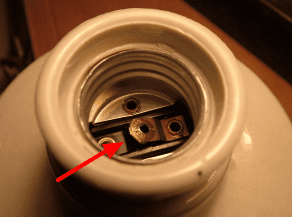Just like candles, all light bulbs eventually burn out and die. But even light bulbs with the shortest lifespan should last around 2,000 hours.
So if you find yourself replacing a bulb once a month or more, something’s wrong.
Assuming that you’re using a bulb that is the correct wattage and size, the first step to answering this question is some good old fashioned troubleshooting.
To help you, we’ve compiled a list of 4 issues to check for along with what to do in each situation. Start at the top and work your way down the list to determine why your light bulbs keep burning out.
Step #1: Check for bulbs screwed in too tightly
Screwing a bulb in too tight flattens the small brass tab shown in the picture below. Normally, this tab is slightly raised.
But if it is flattened, the bulb won’t connect properly with the tab. This can cause an electrical arc which can severely decrease your light bulb’s lifespan.
This brass tab should be raised of an inch from the bottom.
How to fix this:
Turn off the light. Unscrew your bulb and check the brass tab. Is it sticking up slightly?
If not, use needle-nose pliers (or tweezers) to gently raise the tab about one quarter of an inch. **Be sure the power is disconnected before attempting this!**
If you’ve unscrewed the lightbulb and the brass tab is in proper placement, continue on to step #2.
Step #2: Check for vibrations
If you are using a standard incandescent bulb or a CFL (compact fluorescent lamp), avoid placing these in fixtures that receive a lot of vibration. The vibration causes damage to the components of both bulbs and often leads to shorter lifespans.
Here are areas in a home that are usually “high vibration” areas:
- Under or near stairs
- Ceiling fans
- Near or directly underneath washer/dryer or children’s rooms
- Garage
How to fix this:
Buy either:
- Rough service light bulbs– these bulbs are “vibration resistant”
- LED lights- these bulbs don’t have fragile components like filaments or glass that can break easily
Vibrations not your problem? Let’s move on to see if your bulb is burning itself out…
Step #3: Check your bulb for adequate ventilation
A bulb can actually burn itself out by overheating, especially if it is in an enclosed or recessed light fixture.
A recessed light (seen above) is built into the ceiling, meaning the bulb is completely encased. Photo courtesy of WormDSGN
Usually, there are ventilation ports on recessed light fixtures that prevent the bulb from overheating inside the casing. But there are two reasons why your bulb may still overheat and burn out quickly:
- The ventilation ports are clogged
- Your bulb is not designed for recessed lighting
How to fix this:
Clear any insulation, dust or debris that may be clogging the light’s ventilation holes. Then check to be sure that your bulb is “enclosed fixture suitable“.
This still holds true for LED lights. Although LED’s produce less heat than incandescents, they still produce enough heat to build up in an enclosed fixture. Read the packaging to be sure that your LED light is specifically approved for recessed lighting.
Step #4: Protect your home (and light bulbs) from power surges
The standard U.S. home voltage is 120 volts. But if you find yourself frequently replacing bulbs for various light fixtures throughout your home, your bulbs may be dying from intermittent power surges.
Power surges are caused by a number of things including lightning, heavy machinery operating nearby, or a damaged power line.
A power surge can fry appliances and cause you to go through light bulbs quickly.
How to fix this:
Install a whole-home surge protector. These are placed at your electrical service panel and protect your bulbs (and other appliances) by blocking any extra flow of voltage. These devices can cost anywhere from $200-$500.
Still wondering why your bulbs are dying so quickly?
If you’ve ruled out all of the above issues, you may be dealing with wiring issues due to poor installation. Because it can be hard to differentiate between good wiring and bad wiring (and because dealing with wires can be dangerous) you should call an electrician if you think this is the case.
If you live in the Phoenix area, schedule an appointment with George Brazil’s professional electricians for help determining why your light bulbs burn out so quickly.

